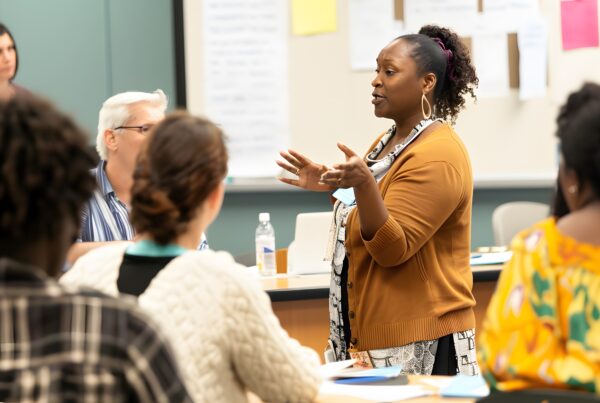
As schools dive deeper into each new school year, complete with its own sets of challenges, effective leaders reflect on, revise, and create building practices and processes that positively impact student achievement. The strongest school-related factor affecting student achievement is the teacher in the classroom (Opper, 2019). So while all of a leader’s many responsibilities are part of creating a school that increases student achievement, one of the most important is developing teacher expertise.
This series of articles will focus on one of the five conditions for leaders to develop teacher expertise. The articles will offer research, ideas, and specific professional development recommendations to assist building leaders to strengthen these critical areas and continue supporting teacher growth. This article will define and describe the five conditions for leaders to develop teacher expertise and suggest ways school teams can identify and prioritize conditions whose improvement can reap big gains in teacher.
Read The 5 Conditions for Developing Teacher Expertise
- Part I: Supporting a Common Language of Instruction
- Part II: Supporting Teachers with Deliberate Practice and Feedback
- Part III: How Instructional Leaders can Develop a Learning Organization
- Part IV: Creating and Overcommunicating Clarity
- Part V: Creating a Culture of Continuous Improvement
How much does teacher expertise impact student achievement?
Figure 1 below depicts the expected percentile gain of a student who begins the year at the 50th percentile within classrooms taught by teachers of varying degrees of competence (Marzano et al., 2011, p. 2).
Students who have a teacher at the 50th percentile of instructional expertise will be expected to still be at the 50th percentile themselves at the end of the year.
But as teachers grow in expertise, students’ achievement increases as well.
If a teacher in the 50th percentile raised his or her competence by 2 percentile points each year, the average achievement of students in his or her classes would be expected to increase 8 percentile points over a 10-year period.
| Teacher Skill Percentile Rank | Predicted Percentile Gain for Student at the 50th Percentile | Predicted Percentile Rank for Students |
| 50th | 0 | 50th |
| 70th | 8 | 58th |
| 90th | 18 | 68th |
| 98th | 27 | 77th |
Figure 1. The relationship between teachers’ skill level and student gains and achievement. Adapted from Marzano, Frontier, and Livingston (2011, p. 2).
How do leaders help and support teachers to make continuous growth?
Is it talent, intelligence, or a gift of nature that predicts who will develop expertise?
Researchers like Ericcson and Charness note that these attributes, while helpful, do not determine who will or will not develop and grow in their skills. Rather, individuals “dramatically increase their performance through education and training if they have the necessary drive and motivation” (Ericcson & Charness, 1994, p. 727).
How can school leadership teams create an environment that supports and encourages that drive and motivation, while also providing opportunities to learn and practice pedagogical skills?Building leaders recognize the strong connection between teacher expertise and student achievement and seek to support teacher growth through feedback, professional development, and coaching.
As in any aspect of leadership, however, taking action is only part of the picture. The other critical part of teacher development is measuring progress towards the goal and then adjusting plans to move in a positive direction. Instructional leaders must know what factors impact teacher growth, examine data to determine where the successes are, and identify the opportunities that still exist.
The 5 Conditions for Teacher Expertise
Marzano, Frontier, and Livingston (2011 p. 4) propose five conditions that must be met to systematically develop teacher expertise. They are:
- Common language of instruction (a well-articulated knowledge base for teaching)
- Focused feedback and deliberate practice
- Opportunities to observe and discuss teaching and learning
- Clear criteria and a plan for success
- Recognition of progress towards expertise
1. Common Language of Instruction
Dr. Robert Marzano and Dr. Beverly Carbaugh posit “an instructional leader must guarantee the implementation of rigorous instructional practices and actively articulate a vision for what instruction should look like in the school” (2018, p. 40).
It makes sense. If leaders and teachers cannot define or identify what good instruction looks and sounds like, and if they do not have a common set of terms they can use to discuss feedback, chances are good that there will be miscommunication and misconceptions.
Having an organized instructional framework strongly grounded in the research around teaching and learning, like the Focused Teacher Evaluation Model, allows a level of clarity that can increase teacher expertise.
| Common Language of Instruction: How will you know when this attribute is strong in your school? |
|
2. Focused Feedback and Deliberate Practice
When there is a clear, common language of instruction – an agreed upon instructional model – school leaders have the foundation to develop teacher expertise, but it can’t stop there.
Effective school leaders consistently provide teachers with feedback. Generally, feedback needs to be combined with focus, support, and opportunities to learn new strategies before it has significant impact in growing teacher expertise.
Encouraging teachers to narrow their focus to one or two specific instructional strategies to deliberately practice over the course of a school year allows them to make incremental growth.
| Focused Feedback and Deliberate Practice: How will you know? |
|
3. Opportunities to Observe and Discuss Teaching
“If teachers do not have opportunities to observe and interact with other teachers, their method of generating new knowledge about teaching is limited to personal trial and error” (Marzano et al., 2011 p. 7).
School Leadership for Results (Marzano & Carbaugh, 2018) describes the need and purpose for teacher collaboration. In Domain 4 of the Focused School Leader Evaluation Model, element 1 states: “The school leader ensures that teachers work in collaborative groups to plan and discuss effective instruction, and address curriculum, assessments, and the achievement of each student” in order to enhance instruction and student achievement (p. 97).
Now, there is less isolation among teachers within a school than ever before. Professional Learning Communities (PLCs) are common structures for collaborative teacher work.
But could this collaboration be strengthened to more strongly impact instruction?
Teachers observing each other, providing feedback, and sharing ideas can lead not only to a stronger sense of trust and collaboration within the profession, but also positively develop teacher expertise.
| Opportunities to Observe and Discuss Teaching: How will you know? |
|
4. Clear Criteria and a Plan for Success
Without a clear set of criteria, how will teachers know when they have achieved success?
Just as we want teachers to do for students in the classroom, leaders need to communicate what constitutes effective teaching.
If teachers don’t know what success looks like, it is hard for them to chart a path to it and impossible to tell when they are approaching.
The Focused Teacher Evaluation Model provides tools that assist leaders with communicating clear criteria for success.
The Focused instructional model itself provides a clear picture, with twenty-three specific elements organized into four domains. Each element has a protocol that includes descriptions, examples and a scale (i.e. rubric) that describe novice-to-expert use of that element.
| Clear Criteria and a Plan for Success: How will you know? |
|
5. Recognition of Progress
According to many researchers, expertise does not develop quickly without significant support. A critical part of that support lies in helping teachers maintain their motivation and dedication to growth.
One key motivating factor for teachers is recognition of their efforts and their growing expertise. How do leaders communicate higher expectations while at the same time celebrating progress along the way?
| Recognition of Progress: How will you know? |
|
Time to reflect
How does your building or district measure up to these five conditions? Consider each and determine whether each condition is an area of strength, or one that needs to be addressed.
- Formally or informally, survey your leadership team and staff. What evidence do you have that this condition is currently in place and operating at strength?
- List specific evidence both for strength and for growth.
- In discussion with your leadership team or staff, prioritize the five conditions by utilizing a decision-making process like the one below.
| Decision-Making Process Tool Which condition for increasing teacher expertise will your school address first?Instructions:
|
|||||
| Criteria | The five conditions for teacher expertise: | ||||
| Common Language of Instruction | Focused Feedback and Deliberate Practice | Opportunities to Observe and Discuss Teaching | Clear Criteria and a Plan for Success | Recognition of Progress | |
| Enter 1 in the column if it does not meet the criteria well, 2 if it is marginal or in progress, 3 if it meets the criteria strongly | |||||
| Currently our weakest condition (importance score: 1) |
|||||
| Easiest to address (importance score: 2) |
|||||
| Most potential for positive impact (importance score: 3) |
|||||
| Score (add products of importance score and conditions score) |
|||||
References
Carbaugh, B.G. & Marzano, R.J. (2018). School leadership for results: A focused model. Instructional Empowerment.
Ericsson, K. A., & Charness, N. (1994). Expert performance: Its structure and acquisition. American Psychologist, 49(8), 725–747
Marzano, R.J. Frontier, T & Livingston, D. (2011) Effective supervision: Supporting the art and science of teaching. ASCD.
Opper, I.M. (2019). Teachers matter: Understanding teachers’ impact on student achievement. RAND Corporation.
About The Author: Kathleen Marx
Kathleen Marx, MSEd, is a leading expert in personal development across industries. Ms. Marx has worked closely with Dr. Robert J. Marzano and the Marzano Evaluation Center team in developing content and training new staff developers. Her background in classroom teaching, gifted education consulting, school counseling, life-success facilitation, and school leadership give her unique insights into leading strategies in implementing research-based instructional and evaluation models. She earned her master’s degrees in educational leadership and school counseling from the University of Dayton.




